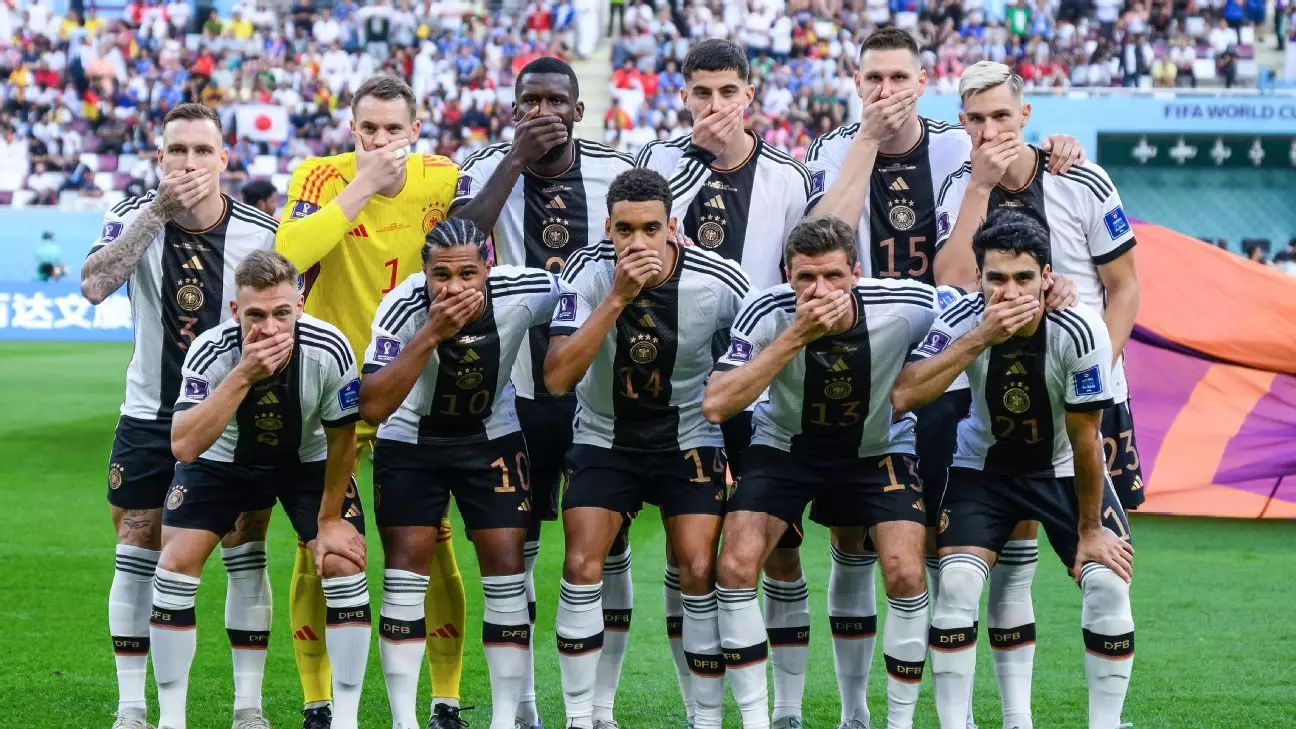In a recent press conference, Joshua Kimmich, the newly appointed captain of the German national football team, articulated a viewpoint that balances the ideals of sportsmanship with the realities of political engagement. Ahead of significant discussions regarding Saudi Arabia’s bid to host the 2034 World Cup, Kimmich’s statements reflected a common dilemma faced by professional athletes: the responsibility to uphold societal values while recognizing the boundaries of their political expertise.
Kimmich emphasized that while players like himself should embody specific values, there is a limitation to their influence in political matters. His assertion—”It is not our job to express ourselves politically all the time”—highlights a critical point in the dialogue about sports and politics. The expectation for athletes to be vocal on social issues can often overshadow their primary roles as competitors. Kimmich seems to advocate for balance; he acknowledges that athletes live in a political climate yet insists that their contributions should stem from a place of genuine understanding rather than obligation.
Reflecting on Germany’s experience at the 2022 World Cup in Qatar, Kimmich pointed out that political stances can sometimes detract from the essence of the sport. The team’s decision to protest against FIFA’s sanctions regarding the “OneLove” armband during their group match against Japan drew attention but also diverted focus from competitive endeavors. Kimmich noted, “We did not present an overall good picture as a team and country” during the tournament due to the surrounding controversies.
This introspection reveals the delicate balance between activism and athletics. While the intention behind political gestures may be noble, they can unintentionally complicate an athlete’s primary purpose: to excel in competition. The mixed outcomes of Germany’s actions in Qatar stress the need for athletes to consider the consequences of their political expressions.
Kimmich’s recognition of the limits of his own political knowledge further solidifies his pragmatic approach as a leader. When he remarked, “I am no political expert,” he acknowledged the need for individuals who are well-versed in political discourse to engage in those discussions. This shift towards valuing expertise over emotional protestation is pivotal in ensuring that athletes are not burdened with responsibilities that are beyond their training and vocation.
The call for self-awareness among football players is an essential aspect of modern sports culture. Athletes are idolized, and their beliefs can influence large audiences; however, their knowledge in socio-political matters may not necessarily match their visibility. By advocating for a division of labor—where political leaders and experts articulate policies and sports figures focus on athletic excellence—Kimmich sets a precedent for future athletes.
Saudi Arabia’s candidacy for the 2034 World Cup remains a contentious point in the dialogue surrounding sports and politics. Human rights organizations have raised significant concerns regarding the country’s record on human rights, placing pressure on figures like Kimmich to take a stance. However, he aptly noted that players should prioritize their responsibility toward competition and performance: “After all, it is our duty to do our best when nominated because we are measured on results.”
As the countdown to the FIFA Congress vote continues, the blend of sport with global politics will undoubtedly remain in the spotlight. While some may argue that athletes have a platform to address social injustices, Kimmich’s perspective pushes back against this notion, asking for a more strategic and informed approach to advocacy.
Ultimately, Kimmich’s stance resonates with a growing acknowledgment within the sports community: that players must strike a balance between upholding values and focusing on their craft. By embracing this dichotomy, athletes can maintain their integrity while ensuring their primary focus remains on representing their teams and nations on the field. The intersection of sports and politics is complex, and while players have a role in fostering change, their limitations should not overshadow their dedication to the sport they love. As the world watches, it becomes clear that navigating these waters requires careful consideration and, above all, respect for the boundaries that define both domains.

